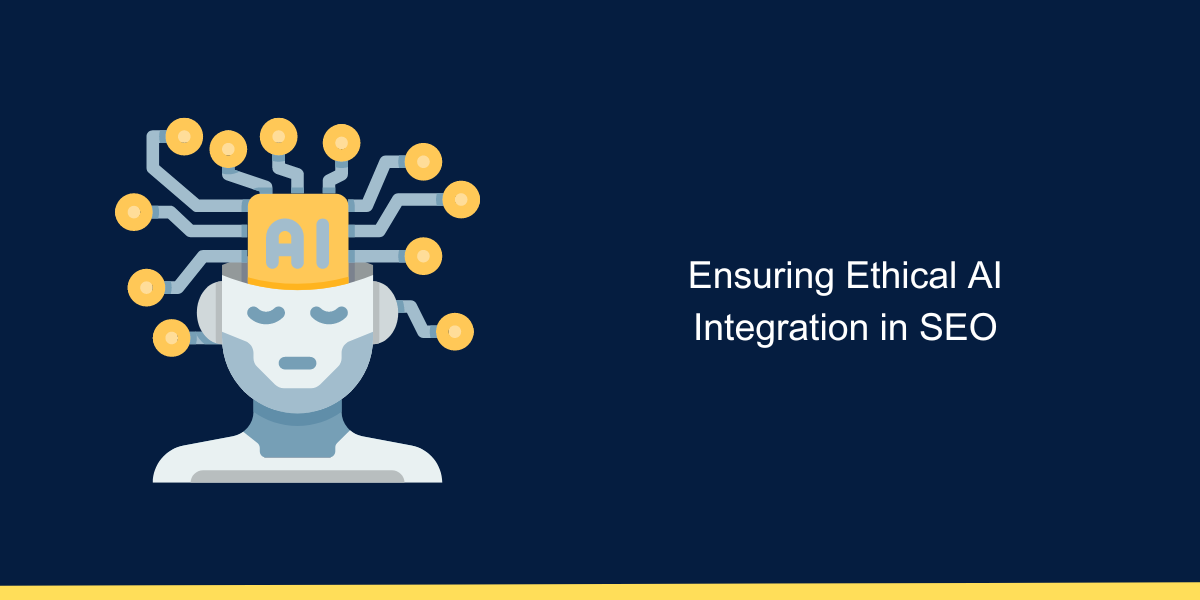
Ethical AI in SEO: Balancing Innovation with Responsibility
Artificial Intelligence (AI) is revolutionizing Search Engine Optimization (SEO), offering powerful tools to enhance website performance, analyze data, and improve user experiences. However, the integration of AI in SEO also raises ethical considerations that must be addressed to ensure responsible use. This article explores how to harness AI for SEO ethically, balancing innovation with responsibility.
Understanding AI in SEO
AI in SEO involves using machine learning algorithms, natural language processing, and data analytics to optimize websites for search engines. AI can automate tasks like keyword research, content generation, and performance analysis, making SEO more efficient and effective.
Ethical Considerations in AI-Driven SEO

- Transparency and Accountability
Best Practices:
- Clear Disclosure: When AI-generated content is used, clearly disclose it to users. Transparency builds trust and avoids misleading your audience.
- Algorithm Accountability: Understand and regularly review how AI algorithms make decisions. Ensure that the data used to train these algorithms is accurate and free from biases.
- Avoiding Manipulative Practices
Best Practices:
- Ethical Link Building: Use AI to identify legitimate link-building opportunities rather than engaging in manipulative practices like buying links or using link farms.
- Quality Over Quantity: Focus on creating high-quality, valuable content with AI assistance rather than churning out large volumes of low-quality content designed to game the system.
- User Privacy
Best Practices:
- Data Protection: Ensure that any user data collected for AI analysis is stored securely and used in compliance with privacy regulations such as GDPR and CCPA.
- Consent and Transparency: Be transparent about data collection practices and obtain explicit consent from users when necessary.
- Bias and Fairness
Best Practices:
- Bias Mitigation: Regularly audit AI systems for biases that could unfairly affect search results. Use diverse data sets to train AI models to minimize bias.
- Inclusive Content: Ensure that AI-generated content is inclusive and representative of diverse perspectives. Avoid reinforcing stereotypes or biases in content.
Ethical Applications of AI in SEO
- Enhanced User Experience
AI can analyze user behavior and preferences to deliver personalized experiences. For example, AI can recommend relevant content, products, or services based on user interactions.
Best Practices:
- Personalization with Consent: Personalize content and recommendations based on user behavior, but ensure users are aware and have consented to such personalization.
- User-Centric Design: Use AI insights to improve website navigation, load times, and overall user experience, prioritizing user needs and preferences.
- Content Creation and Optimization
AI tools can assist in creating and optimizing content, from generating blog posts to refining meta tags and headlines.
Best Practices:
- Human Oversight: While AI can assist in content creation, human oversight is crucial to ensure quality, accuracy, and relevance.
- Value-Driven Content: Focus on producing content that provides real value to users, leveraging AI to enhance rather than replace human creativity and insight.
- SEO Performance Analysis
AI can analyze vast amounts of data to identify trends, track performance, and suggest improvements.
Best Practices:
- Data-Driven Decisions: Use AI-driven insights to make informed decisions about SEO strategies. Regularly review and validate AI-generated recommendations.
- Continuous Improvement: Use AI to monitor and adapt SEO strategies based on performance metrics, but always incorporate human judgment to contextualize data.
Balancing Innovation and Responsibility

The integration of AI into SEO offers significant benefits, but it must be done responsibly. Here are some overarching principles to guide ethical AI use in SEO:
- Commitment to Integrity: Uphold high ethical standards in all SEO practices, avoiding shortcuts that may lead to short-term gains but long-term penalties or damage to reputation.
- User-Centric Approach: Prioritize the needs and interests of users in all AI-driven SEO strategies. Focus on enhancing user experience and delivering genuine value.
- Continuous Education and Adaptation: Stay informed about the latest developments in AI and SEO, including ethical guidelines and best practices. Be willing to adapt strategies as new ethical considerations emerge.
Conclusion
AI has the potential to transform SEO, making it more efficient and effective. However, with great power comes great responsibility. By adhering to ethical principles and best practices, businesses can leverage AI in SEO to achieve their goals while maintaining trust and integrity. Balancing innovation with responsibility ensures that AI-driven SEO not only drives performance but also contributes positively to the digital landscape.



